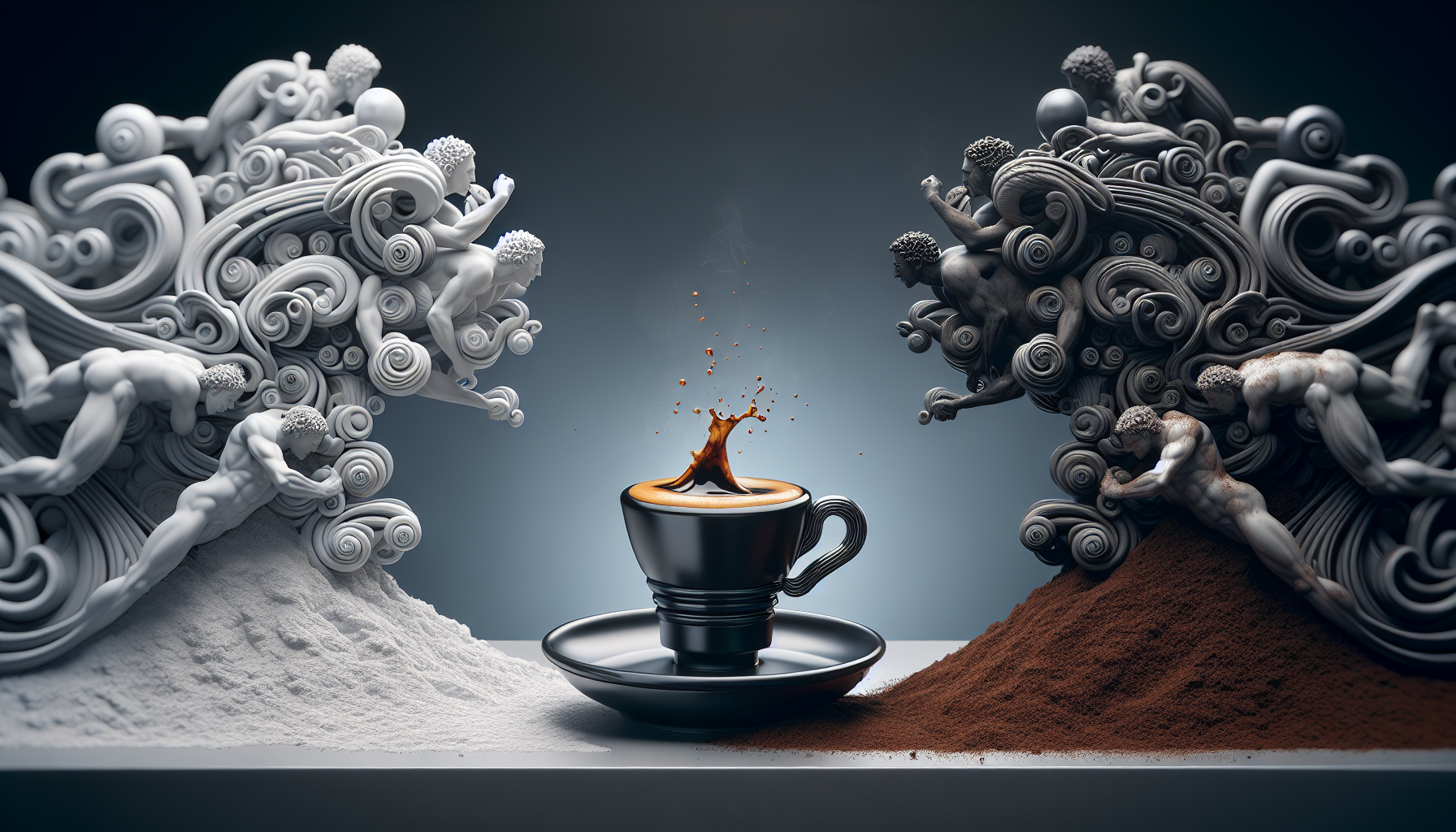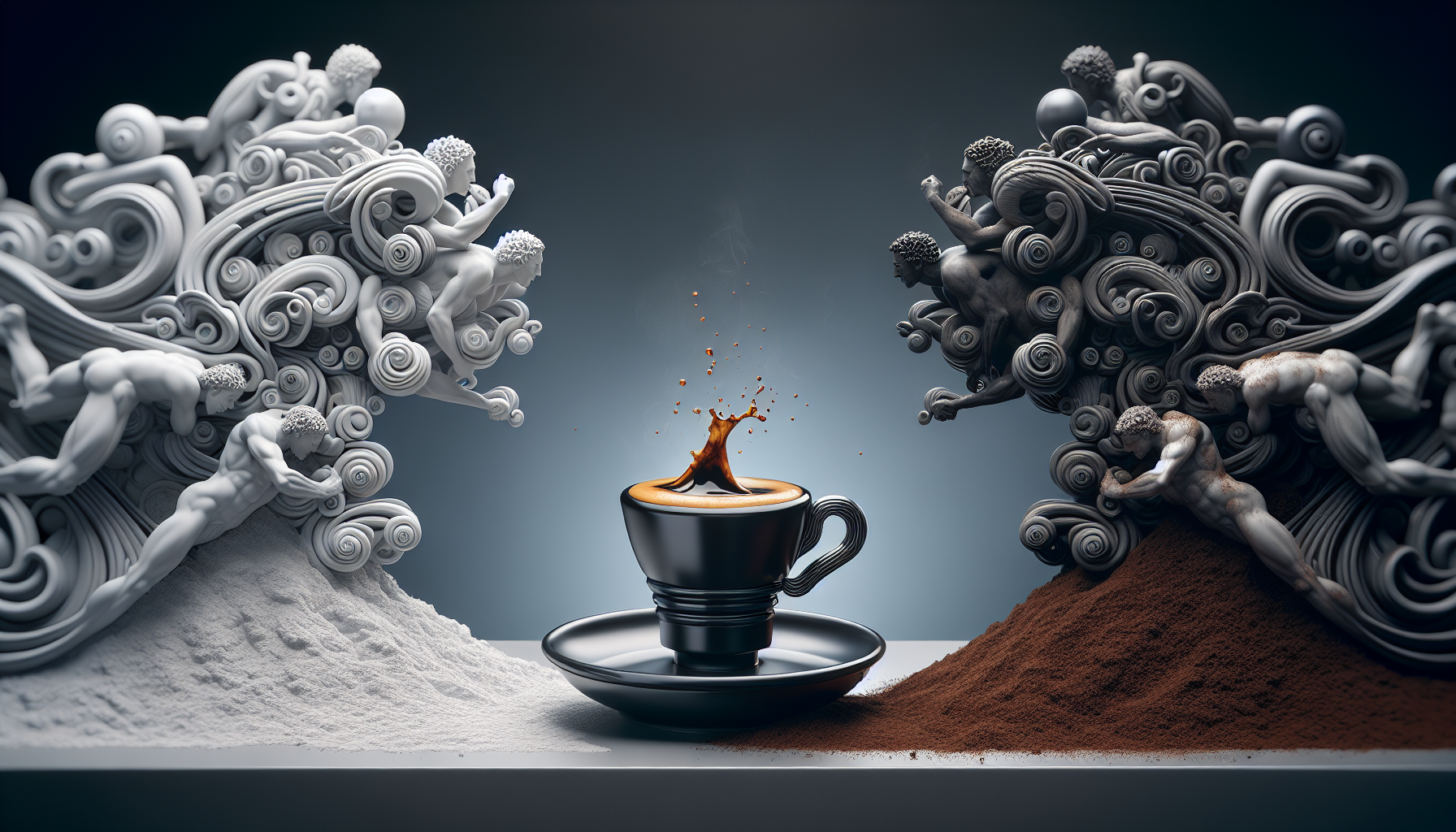Do you often find yourself wondering whether espresso packs a stronger punch compared to regular ground coffee? If that’s the case, you’ve come to the right place! Many coffee enthusiasts debate the intensity and flavor profiles of both espresso and ground coffee. In this article, we’ll explore the differences between these two popular options and uncover whether one reigns supreme in terms of strength. Get ready to sip your way through the caffeine conundrum!

CHECK OUT ESPRESSO MACHINES ON AMAZON
What is Espresso?
Espresso, a beloved and popular beverage, holds a special place in the hearts of coffee enthusiasts worldwide. It is a concentrated coffee drink that is brewed by forcing hot water through finely ground coffee beans under high pressure. The result is a small, highly flavorful, and aromatic shot of coffee that delights the senses and invigorates the body. Espresso is the foundation for various beloved coffee beverages such as cappuccinos, lattes, and macchiatos.
The Definition of Espresso
Espresso, derived from the Italian word meaning “pressed out,” is a brewing method that produces a concentrated coffee extract. To make espresso, a specific coffee-to-water ratio is used, resulting in a strong and flavorful cup of coffee. The defining characteristic of espresso lies in the process of extracting the flavors and aromas from the coffee beans by using high-pressure water.
How is Espresso Made?
The process of making espresso involves several key steps. Firstly, high-quality coffee beans are carefully chosen and roasted to perfection, ensuring the ideal balance of flavors and aromas. The beans are then finely ground to a consistency that resembles powdered sugar.
Next, the ground coffee is placed in a portafilter, a metal device that holds the coffee grounds. The portafilter is then locked into the espresso machine, and hot water is forced through the coffee at high pressure. This rapid extraction process takes approximately 25 to 30 seconds, resulting in a concentrated shot of espresso with a rich crema on top.
What is Ground Coffee?
Ground coffee, the foundation of many brewing methods, refers to coffee beans that have been finely or coarsely ground, depending on the desired brewing technique. While espresso is a specific brewing method, ground coffee can be used for a variety of brewing methods such as drip brewing, French press, pour-over, and more.
The Definition of Ground Coffee
Ground coffee, simply put, is coffee beans that have been broken down into smaller particles suitable for brewing. This process allows for efficient extraction of the flavors and aromas present in the coffee beans. Ground coffee is available in various grind sizes, ranging from coarse to fine, to suit different brewing methods.
How is Ground Coffee Made?
The process of making ground coffee starts with selecting high-quality coffee beans that are then roasted to bring out the desired flavors. After roasting, the beans are cooled and ground using a grinder. The coarseness or fineness of the grind is determined by the chosen brewing method. Once ground, the coffee is ready to be brewed using any preferred method, allowing for a versatile and customizable coffee experience.
Differences Between Espresso and Ground Coffee
While espresso and ground coffee are both derived from coffee beans, they differ in various aspects, starting from the brewing process to the final flavor characteristics. These differences contribute to the unique experience each beverage offers.
Bean to Water Ratio
One significant difference between espresso and ground coffee lies in the bean to water ratio used during brewing. Espresso typically requires a higher concentration of coffee to water, resulting in a stronger and more intense flavor profile. On the other hand, ground coffee for different brewing methods such as drip brewing or French press uses a higher water to coffee ratio, allowing for a milder and less concentrated cup of coffee.
Grind Size
The grind size of coffee plays a crucial role in the brewing process, affecting the extraction rate and the resulting flavors. Espresso requires a fine grind size, similar to powdered sugar, to ensure proper extraction under high pressure. Ground coffee for other brewing methods, such as French press or pour-over, usually requires a coarser grind size to allow for a slower extraction process.
Brewing Time
Another difference between espresso and ground coffee is the brewing time. Espresso is brewed quickly, typically within 25 to 30 seconds, resulting in a concentrated and robust shot of coffee. Ground coffee brewed using methods like drip brewing or French press generally takes several minutes, allowing for a more gradual extraction process and a milder cup of coffee.
Extraction Process
The extraction process for espresso and ground coffee also differs significantly. Espresso extraction utilizes high-pressure water passing through compacted finely ground coffee, resulting in rapid flavor extraction. In contrast, ground coffee brewing methods involve water gradually passing through coarser coffee grounds, allowing for a slower extraction and a different flavor profile.
Caffeine Content
Caffeine content is another aspect in which espresso and ground coffee may differ, impacting the intensity of the caffeine buzz and the overall experience.
Caffeine in Espresso
Contrary to popular belief, espresso does not necessarily contain more caffeine than regular drip coffee by volume. However, due to the concentrated nature of espresso, a single shot of espresso typically contains less overall caffeine content than a cup of drip coffee. On average, a 1-ounce shot of espresso contains approximately 63 milligrams of caffeine.
Caffeine in Ground Coffee
Ground coffee, when brewed using different methods, can result in varying caffeine content depending on factors such as the coffee-to-water ratio and brewing time. A typical 8-ounce cup of brewed coffee contains an average of 95 milligrams of caffeine. It is essential to note that these values can vary depending on the specific coffee bean used, the brewing technique, and personal preference.
Flavor Characteristics
The flavor characteristics of espresso and ground coffee significantly impact the overall coffee experience, allowing individuals to tailor their choice based on their preferences.
Espresso Flavor Profile
Espresso exhibits a unique flavor profile due to its concentrated form. It is known for its robust, bold, and intensified taste, with prominent notes such as deep chocolate, caramel, and even fruity undertones. The crema, a frothy layer on top of an espresso shot, adds a creamy texture and enhances the overall flavor experience.
Ground Coffee Flavor Profile
Ground coffee used for various brewing methods offers a broader range of flavor profiles, depending on factors such as the coffee bean origin, roast level, and brewing technique. Ground coffee brewed through methods like drip brewing or French press typically exhibits a more balanced and nuanced flavor profile. Individual notes of acidity, sweetness, and aromas specific to the coffee beans can be more pronounced in ground coffee compared to espresso.
Health Benefits
Coffee, whether consumed as espresso or ground coffee, has been linked to numerous potential health benefits. Regular, moderate consumption can contribute positively to overall well-being.
Potential Health Benefits of Espresso
Espresso, like all coffee, contains antioxidants that can help protect the body against chronic diseases. It has been associated with potential benefits such as increased alertness, improved focus, and enhanced cognitive performance. Additionally, moderate consumption of espresso has been linked to a reduced risk of developing certain conditions like Parkinson’s disease, liver disease, and certain types of cancer.
Potential Health Benefits of Ground Coffee
Ground coffee, when consumed responsibly, offers similar potential health benefits to espresso. Regular consumption of coffee has been associated with a reduced risk of stroke and certain types of cancer, as well as improved liver health. Additionally, the antioxidants present in ground coffee may have anti-inflammatory properties that support a healthy immune system.
Brewing Methods
The brewing methods for espresso and ground coffee differ, catering to different preferences and allowing individuals to explore various taste profiles.
Espresso Brewing Methods
Espresso brewing requires specialized equipment such as an espresso machine capable of creating the necessary pressure to extract the flavors properly. Traditional espresso machines use a manual lever or pump to generate pressure, while modern machines often employ an electric pump. Additionally, espresso can also be brewed using alternative methods such as stovetop espresso makers or AeroPress, offering flexibility in creating a rich, concentrated coffee experience.
Ground Coffee Brewing Methods
Ground coffee offers versatility in brewing methods, accommodating different preferences and personal taste. Popular brewing methods include drip brewing, French press, pour-over, and cold brew. Each method requires specific equipment such as coffee makers, French press pots, or pour-over devices. These brewing methods provide opportunities for individuals to experiment with different variables like water temperature, brewing time, and coffee-to-water ratio to achieve their desired flavor profile.
Cost Comparison
The cost of making espresso or brewed ground coffee can vary depending on factors such as the quality of coffee beans, equipment used, and personal consumption habits.
Cost of Making Espresso
Making espresso can be cost-effective in the long run if one invests in a high-quality espresso machine and buys whole coffee beans in bulk. However, the upfront cost of purchasing an espresso machine can be significant. Additionally, the ongoing expense of purchasing quality coffee beans can add to the overall cost. Nevertheless, when compared to purchasing espresso-based beverages from coffee shops, making espresso at home can save money over time.
Cost of Making Ground Coffee
The cost of making ground coffee depends on factors such as the price of the coffee beans, the brewing method used, and the desired quality of coffee. Buying whole coffee beans and grinding them at home offers more control over the quality and freshness of the coffee, potentially resulting in a higher cost upfront. However, brewing ground coffee using methods like drip brewing or French press can be more cost-effective in terms of ongoing expenses compared to purchasing individual cups of coffee from cafes.
CHECK OUT ESPRESSO MACHINES ON AMAZON
Popular Uses
Both espresso and ground coffee find themselves in various popular uses, catering to different preferences and occasions.
Popular Uses for Espresso
Espresso serves as the foundation for popular coffee beverages such as cappuccinos, lattes, and macchiatos. These drinks combine espresso shots with steamed milk, foam, and additional flavorings like caramel or chocolate to create indulgent and flavorful creations. Additionally, espresso can be enjoyed as a standalone shot, sipped leisurely to savor its distinct and robust flavors.
Popular Uses for Ground Coffee
Ground coffee’s versatility allows for a multitude of popular uses. It can be brewed into a classic cup of black coffee, providing a delightful and aromatic start to the day. Ground coffee is also a crucial ingredient in desserts, enhancing the flavors of coffee-infused cakes, cookies, and ice creams. Furthermore, ground coffee can be transformed into refreshing cold brews or used for iced coffee creations during hot summer months. The possibilities are endless.
Preference and Personal Taste
When it comes to choosing between espresso and ground coffee, personal preference and taste play an essential role.
Factors Influencing Preference
Several factors can influence an individual’s preference for espresso or ground coffee. The desired strength and concentration of flavors, the brewing time available, and the overall coffee experience sought are all key factors to consider. Those who enjoy bold and intense flavors, short brewing times, or the sophistication of espresso-based beverages may lean towards espresso. On the other hand, individuals who prefer a milder and longer coffee experience, varied flavor profiles, and the versatility of brewing methods may prefer ground coffee.
Personal Taste and Preference
Personal taste ultimately reigns supreme when it comes to choosing between espresso and ground coffee. Each person has unique preferences when it comes to the strength, flavor characteristics, and caffeine content they desire in their coffee. Some may find the quick jolt of caffeine and the robustness of espresso invigorating, while others may prefer the milder and more varied experience of brewed ground coffee. Experimentation and exploration of different brewing methods can help individuals discover their personal favorites.
In conclusion, both espresso and ground coffee offer distinct and enjoyable experiences for coffee lovers. Espresso, with its concentrated and bold flavor profile, serves as the foundation for a myriad of beloved coffee-based beverages. Ground coffee, on the other hand, offers versatility in brewing methods, allowing individuals to explore varied flavor profiles and tailor their coffee experiences to personal preferences. Whether it be the strong and intense allure of espresso or the diverse and mellow flavors of ground coffee, there is a cup suited to every coffee enthusiast’s tastes. So go forth, sip, savor, and enjoy your preferred cup of coffee. Cheers!

